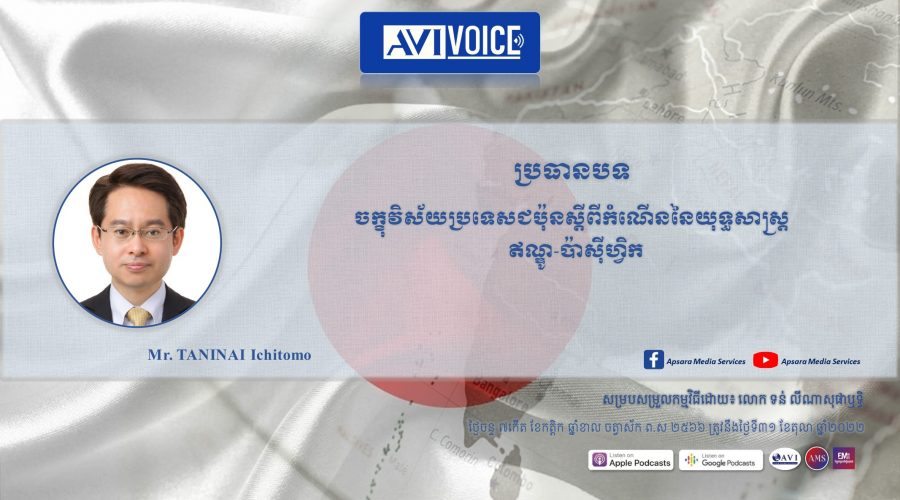សំណួរទី១៖ ជាបឋម តាមទស្សនៈរបស់ (វាគ្មិន) តើ (វាគ្មិន) កំណត់អត្ថន័យយុទ្ធសាស្ត្រឥណ្ឌូ-ប៉ាស៊ីហ្វិកក្នុងពិភពលោកបច្ចុប្បន្នដោយរបៀបណា? ហេតុអ្វីបានជាអ្នកជឿថាតំបន់(ឥណ្ឌូ ប៉ាស៊ីហ្វិក)មានសក្តានុពលច្រើននិងក្លាយជាតំបន់ដែលមានឥទ្ធិពលខ្លាំងដូចនេះ?
ថ្មីៗនេះ ប្រទេសកាន់តែច្រើន បានបង្កើតចក្ខុវិស័យរៀងៗខ្លួននៃយុទ្ធសាស្ត្រឥណ្ឌូ-ប៉ាស៊ីហ្វិក។ ទាំងនេះរួមមានចក្ខុវិស័យរបស់ជប៉ុនក្នុងយុទ្ធសាស្ត្រឥណ្ឌូ-ប៉ាស៊ីហ្វិកសេរី និងបើកចំហ (FOIP) ព្រមទាំងទស្សនវិស័យឥណ្ឌូ-ប៉ាស៊ីហ្វិករបស់អាស៊ាន (AOIP) និងយុទ្ធសាស្ត្រឥណ្ឌូ-ប៉ាស៊ីហ្វិករបស់សហរដ្ឋអាមេរិក។ 2. ចំនួននៃយុទ្ធសាស្ត្រផ្សេងៗគ្នាបង្ហាញពីការយកចិត្តទុកដាក់កាន់តែខ្លាំងឡើងលើតំបន់នេះក្នុងទំនាក់ទំនងការទូត។
តាមទីតាំងភូមិសាស្ត្រ តំបន់ឥណ្ឌូ-ប៉ាស៊ីហ្វិក គ្របដណ្តប់តំបន់ធំទូលាយជុំវិញមហាសមុទ្រទាំងពីរ ដូចនៅក្នុងឈ្មោះ។ វាលាតសន្ធឹងពីមហាសមុទ្រប៉ាស៊ីហ្វិក ឆ្លងកាត់ទ្វីបអាស៊ី និងមហាសមុទ្រឥណ្ឌា រហូតដល់មជ្ឈិមបូព៌ា និងទ្វីបអាហ្វ្រិក។ នៅក្នុងតំបន់ដ៏ធំនេះ មានប្រជាជាតិ និងកោះរាប់រយ ហើយជាងពាក់កណ្តាលនៃចំនួនប្រជាជនពិភពលោករស់នៅក្នុងនោះ។ ជាការពិតណាស់ បណ្តាប្រទេសអាស៊ានមានទីតាំងនៅចំកណ្តាល នៃតំបន់នេះ។
វាជារឿងសំខាន់ដែលត្រូវកត់សម្គាល់ថា ប្រទេសភាគច្រើននៅក្នុងតំបន់នេះ មានវ័យនៅក្មេង ប៉ុន្តែកំពុងរីកចម្រើនយ៉ាងឆាប់រហ័ស និងមានសក្តានុពលដ៏ខ្លាំងក្លាសម្រាប់កំណើនទៅអនាគត។ យើងអាចសំដៅទៅលើតំបន់ឥណ្ឌូ-ប៉ាស៊ីហ្វិកជាស្នូលនៃភាពរឹងមាំរបស់ពិភពលោក ព្រោះវាជាគន្លឹះនៃវិបុលភាពសកល។
ម្យ៉ាងវិញទៀត ដោយសារភាពតានតឹងផ្នែកភូមិសាស្ត្រនយោបាយបានកើនឡើងរវាងប្រទេសកំពុងងើបឡើង និងប្រទេសមានអំណាច តំបន់ឥណ្ឌូ-ប៉ាស៊ីហ្វិកបានក្លាយទៅជាសង្វៀនសម្រាប់ការប្រកួតប្រជែងអំណាច ហើយជាលទ្ធផល យើងឃើញមានការផ្លាស់ប្តូរយ៉ាងខ្លាំងនៅក្នុងតុល្យភាពអំណាចក្នុងតំបន់។
តំបន់នេះក៏ប្រឈមមុខនឹងការគម្រាមកំហែងជាច្រើនទៀតផងដែរ ដូចជាចោរកម្មតាមសមុទ្រ អំពើភេរវកម្ម ការរីកសាយភាយនៃអាវុធប្រល័យលោក គ្រោះមហន្តរាយធម្មជាតិ ការបំផ្លាញបរិស្ថាន និងការនេសាទខុសច្បាប់។
ដូចបានលើកឡើងខាងលើពីសក្តានុពលសេដ្ឋកិច្ច និងបញ្ហាប្រឈមផ្នែកសន្តិសុខ វាពិតជាមានសារៈសំខាន់ណាស់ក្នុងការធានាបាននូវសន្តិភាព និងវិបុលភាពក្នុងតំបន់ និងលើសពីនេះ ព្រមទាំងនាំមកនូវស្ថិរភាព និងវិបុលភាពដល់គ្រប់ប្រទេសក្នុងតំបន់។
FOIP របស់ជប៉ុន គឺជាចក្ខុវិស័យដែលស្វែងរកការបង្កើតសណ្តាប់ធ្នាប់ដោយសេរី និងបើកចំហនៅក្នុងតំបន់ឥណ្ឌូ-ប៉ាស៊ីហ្វិក ដោយផ្អែកលើនីតិរដ្ឋ រួមជាមួយការគាំទ្រមជ្ឈិមភាព និងសាមគ្គីភាពរបស់អាស៊ាន។ សំខាន់ណាស់ គឺជប៉ុនស្វាគមន៍ប្រទេសណាដែលចែករំលែក ឬគាំទ្រគំនិតនេះ ដោយជប៉ុនគឺរីករាយនឹងធ្វើការជាមួយពួកគេ។
សម្រាប់ប្រទេសជប៉ុន សារៈសំខាន់នៃទិដ្ឋភាពរួមនៃមហាសមុទ្រឥណ្ឌា និងប៉ាស៊ីហ្វិក មិនមែនជាការច្នៃប្រឌិតថ្មីៗនោះទេ។ គោលគំនិតនៃ FOIP ត្រូវបានកំពុងអភិវឌ្ឍអស់ជាច្រើនឆ្នាំ ហើយមហាសមុទ្រទាំងពីរនេះតែងតែមានសារៈសំខាន់សម្រាប់ប្រទេសជប៉ុន។ ប្រភពដើមនៃគោលគំនិតនៃ FOIP អាចត្រូវបានរកឃើញតាំងពីឆ្នាំ ២០០៧ ក្នុងអំឡុងពេលដំណើរទស្សនកិច្ចផ្លូវការរបស់អតីតនាយករដ្ឋមន្ត្រី អាបេ ទៅកាន់ប្រទេសឥណ្ឌា នៅពេលដែលគាត់បានថ្លែងសុន្ទរកថាដែលមានចំណងជើងថា "The Confluence of two Seas (ចំណុចប្រសព្ធនៃសមុទ្រពីរ"។ បន្ទាប់មកគាត់បានបង្ហាញពីចក្ខុវិស័យរបស់ប្រទេសជប៉ុនសម្រាប់ FOIP ជាផ្លូវការនៅក្នុងសុន្ទរកថាគន្លឹះរបស់គាត់នៅឯ The Sixth Tokyo International Conference on Africa’s Development (TICAD VI) ក្នុងទីក្រុងណៃរ៉ូប៊ីក្នុងខែសីហាឆ្នាំ ២០១៦ ។
នៅក្នុងសុន្ទរកថានោះ លោកនាយករដ្ឋមន្ត្រី អាបេ បានចង្អុលបង្ហាញពីសារៈសំខាន់នៃផ្លូវសមុទ្រដែលតភ្ជាប់អាស៊ី និងអាហ្រ្វិកឆ្លងកាត់មហាសមុទ្រទាំងពីរ ដែលជាគន្លឹះក្នុងការនាំមកនូវស្ថិរភាព និងវិបុលភាពដល់សហគមន៍អន្តរជាតិ។ ហើយនេះនៅតែជាចក្ខុវិស័យរបស់ FOIP ដែលប្រទេសជប៉ុនកំពុងធ្វើសម្រាប់ថ្ងៃនេះ។
សំណួរទី២៖ ដោយសារប្រទេសជប៉ុនជារដ្ឋដំបូងគេដែលផ្តួចផ្តើមបង្កើតគំនិតនៃយុទ្ធសាស្ត្រឥណ្ឌូ-ប៉ាស៊ីហ្វិកនេះ តើជប៉ុនមានចក្ខុវិស័យអ្វីខ្លះសម្រាប់ឥណ្ឌូ-ប៉ាស៊ីហ្វិកសេរី និងបើកចំហ? តើ (វាគ្មិន) មើលឃើញថាមានអត្ថប្រយោជន៍អ្វីខ្លះសម្រាប់រដ្ឋក្នុងតំបន់ និងរដ្ឋក្រៅតំបន់ផងដែរ?
សម្រាប់ប្រទេសជប៉ុន យើងឃើញសមានសសរស្តម្ភធំៗចំនួនបី ដែលរក្សាចក្ខុវិស័យរបស់ FOIP ៖
សសរស្តម្ភទីមួយគឺ៖ ការលើកកម្ពស់គោលការណ៍មូលដ្ឋានរបស់សហគមន៍អន្តរជាតិ ដែលរួមមាននីតិរដ្ឋ សេរីភាពនៃការធ្វើនាវាចរណ៍ និងពាណិជ្ជកម្មសេរី។
សសរស្តម្ភទីពីរគឺ៖ ការស្វែងរកវិបុលភាពសេដ្ឋកិច្ចតាមរយៈការពង្រឹងការតភ្ជាប់ រួមទាំងការអភិវឌ្ឍន៍ហេដ្ឋារចនាសម្ព័ន្ធដឹកជញ្ជូនប្រកបដោយគុណភាព។
សសរស្តម្ភទី៣គឺ៖ ការប្តេជ្ញាចិត្តទៅលើសន្តិភាព និងស្ថិរភាព។ ដោយវានឹងសម្រេចបានតាមរយៈគំនិតផ្តួចផ្តើម ការកសាងសមត្ថភាពដែលផ្តោតលើការអនុវត្តច្បាប់ដែនសមុទ្រ ការកាត់បន្ថយហានិភ័យគ្រោះមហន្តរាយ ការប្រឆាំងចោរកម្មតាមសមុទ្រ និងការមិនរីកសាយភាយនុយក្លេអ៊ែរ ជាដើម។
នោះគឺជាទិដ្ឋភាពទូទៅនៃចក្ខុវិស័យរបស់ប្រទេសជប៉ុនសម្រាប់ FOIP ។ ឥឡូវនេះខ្ញុំចង់គូសបញ្ជាក់ពីទិដ្ឋភាពជាក់ស្តែងបន្ថែមទៀតនៃ FOIP ។
FOIP ត្រូវបានគាំទ្រដោយតុល្យភាពរវាងគោលការណ៍មូលដ្ឋាននិងសកម្មភាពជាក់ស្តែង។ គោលការណ៍និងសកម្មភាពទាំងនេះគឺមិនអាចកាត់ផ្តាច់ចេញពីគ្នាបានឡើយ។ យើងជឿថាវាមានសារៈសំខាន់ណាស់ក្នុងការដាក់កម្មវត្ថុទាំងពីរឱ្យនៅជាមួយគ្នា។
នោះហើយជាមូលហេតុដែលប្រទេសជប៉ុនបានចូលរួមក្នុងគម្រោង Official Development Assistance (ODA) ដ៏ធំទូលាយ ក៏ដូចជាការលើកកម្ពស់ពាណិជ្ជកម្មសេរី និងការវិនិយោគឯកជននៅក្នុងតំបន់ ស្របពេលជាមួយគ្នានេះ យើងកំពុងលើកកម្ពស់គោលការណ៍មូលដ្ឋានដែលលើកកម្ពស់នីតិរដ្ឋ ការគោរពសិទ្ធិមនុស្ស និងពាណិជ្ជកម្មសេរី ជាដើម។
នៅក្នុងប្រទេសកម្ពុជា គម្រោងហេដ្ឋារចនាសម្ព័ន្ធដឹកជញ្ជូនជាច្រើនកំពុងត្រូវបានអនុវត្ត ដើម្បីបង្កើនការតភ្ជាប់។ ជាឧទាហរណ៍ ការសាងសង់ស្ពានអ្នកលឿង (ស្ពាន Tsubasa) ដែលជាផ្នែកមួយនៃយុទ្ធសាស្ត្រកិច្ចសហប្រតិបត្តិការជប៉ុន-កម្ពុជា ដើម្បីអភិវឌ្ឍច្រករបៀងសេដ្ឋកិច្ចភាគខាងត្បូងដែលតភ្ជាប់ប្រទេសវៀតណាម កម្ពុជា ថៃ និងប្រទេសលើសពីនេះ បានបញ្ចប់រួចរាល់ហើយ។ ប្រទេសជប៉ុនក៏កំពុងគាំទ្រដល់ការអភិវឌ្ឍន៍កំពង់ផែស្វយ័តក្រុងព្រះសីហនុផងដែរ ដើម្បីអាចបំពេញតួនាទីរបស់ខ្លួនជាមជ្ឈមណ្ឌលភ័ស្តុភារដ៏សំខាន់សម្រាប់ប្រទេសកម្ពុជា និងតំបន់មេគង្គកាន់តែទូលំទូលាយ។ ជាងនេះទៅទៀត ទាក់ទងនឹងការអភិវឌ្ឍន៍ហេដ្ឋារចនាសម្ព័ន្ធក្នុងតំបន់មេគង្គ ប្រទេសជប៉ុនកំពុងធ្វើការជាមួយដៃគូផ្សេងទៀត រួមមានសហរដ្ឋអាមេរិក និងអូស្ត្រាលី ដើម្បីធ្វើឱ្យប្រសើរឡើងនូវការតភ្ជាប់ទៅវិញទៅមកទូទាំងតំបន់។
ការអភិវឌ្ឍបរិយាកាសធុរកិច្ច និងការវិនិយោគដ៏គួរឱ្យទាក់ទាញ គឺជាគន្លឹះមួយដើម្បីភាពរុងរឿង និងស្ថិរភាពសេដ្ឋកិច្ច។ ដូច្នេះ ដើម្បីឆ្លើយតបទៅនឹងតម្រូវការនេះ យើងបានបើកកិច្ចប្រជុំវិស័យសាធារណៈ និងឯកជន កម្ពុជា-ជប៉ុន ហើយរហូតមកដល់ពេលនេះ យើងបានប្រារព្ធឡើងជាង២០វគ្គ ដើម្បីពិភាក្សា និងឯកភាពគ្នាលើមធ្យោបាយធ្វើឱ្យបរិយាកាសធុរកិច្ចនៅកម្ពុជាកាន់តែមានភាពអំណោយផលដល់អ្នកវិនិយោគបរទេស។ នៅក្នុងកិច្ចប្រជុំនេះ តំណាងរដ្ឋាភិបាល និងវិស័យឯកជនបានពិភាក្សាអំពីបញ្ហាប្រឈមនានា រាប់ចាប់ពីប្រព័ន្ធពន្ធ និងគយ រហូតដល់ការអភិវឌ្ឍន៍ធនធានមនុស្ស។ យើងមានទំនុកចិត្តថាកិច្ចខិតខំប្រឹងប្រែងរួមគ្នាទាំងនេះកំពុងរួមចំណែកដល់ការផ្តល់នូវលទ្ធផលជាក់ស្តែង។
ប្រទេសជប៉ុនក៏យកចិត្តទុកដាក់យ៉ាងខ្លាំងចំពោះការលើកកម្ពស់ពាណិជ្ជកម្មសេរី ដែលជាកត្តាសំខាន់មួយនៃសសរស្តម្ភទីមួយនៃ FOIPរបស់ជប៉ុន ។ ប្រទេសជប៉ុន គឺជាអ្នកផ្សព្វផ្សាយដ៏សំខាន់មួយនៃកិច្ចព្រមព្រៀងភាពជាដៃគូសេដ្ឋកិច្ចគ្រប់ជ្រុងជ្រោយថ្នាក់តំបន់(RCEP), the Comprehensive and Progressive Agreement for Trans-Pacific Partnership (CPTPP) និង ASEAN-Japan Comprehensive Economic Partnership (AJCEP) ។ តាមពិតទៅ ខ្លួនខ្ញុំផ្ទាល់បានចូលរួមក្នុងការចរចា CPTPP ជាសហប្រធានសម្រាប់ក្រុមការងារច្បាប់ CPTPP ក្នុងឆ្នាំ ២០១៧ និង Economic Partnership Agreements (EPAs) ផ្សេងៗទៀត។ យើងសង្ឃឹមថា RCEP នឹងរួមចំណែកដល់ការលើកកម្ពស់ពាណិជ្ជកម្មសេរី យុត្តិធម៌ និងបរិយាកាសវិនិយោគកាន់តែប្រសើរឡើងនៅទូទាំងតំបន់ទាំងមូល។ បើសរុបមក វាមានសារៈសំខាន់ណាស់ក្នុងការថែរក្សាសណ្តាប់ធ្នាប់ដែនសមុទ្រដោយសេរី និងបើកចំហ។
សំណួរទី៣៖ ហេតុអ្វីបានជាកំពូលមហាអំណាច និងមហាអំណាចថ្មីដែលទើបរះឡើងផ្សេងទៀត កំពុងពិនិត្យកែសម្រួលឡើងវិញ និងផ្តោតលើគោលនយោបាយការបរទេសរបស់ពួកគេចំពោះតំបន់(ឥណ្ឌូ ប៉ាស៊ីហ្វិក)នេះ?
យើង (ប្រទេសជប៉ុន)មិនស្ថិតក្នុងតួនាទីដើម្បីធ្វើអត្ថាធិប្បាយលើការផ្លាស់ប្តូរនៃគោលនយោបាយរបស់ប្រទេសដទៃនោះទេ។ ទោះជាយ៉ាងណាក៏ដោយ ដូចដែលខ្ញុំបានលើកឡើងមុននេះ មហាសមុទ្រឥណ្ឌា និងមហាសមុទ្រប៉ាស៊ីហ្វិកតែងតែមានសារៈសំខាន់ចំពោះប្រទេសជប៉ុន។ សារៈសំខាន់នៃអន្តរ-ទិដ្ឋភាពនៃមហាសមុទ្រទាំងពីរ មិនមែនជាការច្នៃប្រឌិតថ្មីៗនោះទេ។ សម្រាប់ប្រទេសជប៉ុន គំនិតរបស់ FOIPត្រូវបាននិងកំពុងអភិវឌ្ឍជាច្រើនឆ្នាំ។
នេះពាក់ព័ន្ធជាពិសេសចំពោះអាស៊ាន ដែលមានទីតាំងនៅកណ្តាលនៃតំបន់ឥណ្ឌូ-ប៉ាស៊ីហ្វិក ហើយជាគន្លឹះក្នុងការសម្រេចបានឱ្យបាននូវ FOIP ។ នៅឆ្នាំ ២០២៣ យើងនឹងប្រារព្ធខួបលើកទី ៥០ នៃទំនាក់ទំនងមិត្តភាព និងកិច្ចសហប្រតិបត្តិការអាស៊ាន-ជប៉ុន។ ប្រទេសជប៉ុននឹងបន្តជំរុញ និងគាំទ្រយុទ្ធសាស្ត្រសហប្រតិបត្តិការរឹងមាំ ដែលរួមចំណែកដល់ការសម្រេចបាននូវ FOIP និងទស្សនវិស័យឥណ្ឌូ-ប៉ាស៊ីហ្វិករបស់អាស៊ាន (AOIP) ហើយដែលចែករំលែកគោលការណ៍មូលដ្ឋានរបស់យើង ដើម្បីលើកកម្ពស់ទំនាក់ទំនងអាស៊ាន-ជប៉ុន ឱ្យកាន់តែខ្ពស់ថែមទៀត។
សំណួរទី៤៖ អ្នកវិភាគមួយចំនួនបានលើកឡើងថា តំបន់ឥណ្ឌូ-ប៉ាស៊ីហ្វិកត្រូវបានគេមើលឃើញថាជាតំបន់យុទ្ធសាស្ត្រសម្រាប់ «មហាអំណាច» ហើយដូច្នេះវាបានក្លាយជាសមរភូមិរបស់ពួកគេក្នុងការប្រកួតប្រជែងសម្រាប់យុទ្ធសាស្ត្រសេដ្ឋកិច្ច ពាណិជ្ជកម្ម សន្តិសុខ និងវិស័យផ្សេងៗទៀត។ ដូចបានលើកឡើងខាងលើ ការចាប់អារម្មណ៍នៅក្នុងតំបន់ឥណ្ឌូ-ប៉ាស៊ីហ្វិកដោយប្រទេសមហាអំណាច និងអំណាចកំពុងងើបឡើងបាននាំឱ្យមានការបង្កើតយុទ្ធសាស្រ្តមួយចំនួនដូចជា FOIP, Indo-Pacific Economic Framework for Prosperity (IPEF), Quadrilateral Security Dialogue (QUAD), សម្ព័ន្ធ AUKUS ជាដើម។ ក្នុងបរិបទនៃសម័យប្រកួតប្រជែងបច្ចុប្បន្នរវាងអាមេរិក និងចិន តើយុទ្ធសាស្ត្រទាំងនេះមានន័យយ៉ាងណាសម្រាប់តំបន់ឥណ្ឌូ-ប៉ាស៊ីហ្វិក? ហើយតើយុទ្ធសាស្ត្រទាំងអស់នេះនឹងមានឥទ្ធិពលយ៉ាងណាទៅលើរដ្ឋតូចៗ ដូចជាកម្ពុជា?
ជំនួសឱ្យការពិភាក្សាអំពីផលប៉ះពាល់នៃយុទ្ធសាស្ត្រផ្សេងៗគ្នាលើតំបន់ ខ្ញុំចង់លើកឡើងពីសារៈសំខាន់ជាសកលនៃច្បាប់អន្តរជាតិ ជាពិសេសច្បាប់សមុទ្រ សម្រាប់ឥណ្ឌូ-ប៉ាស៊ីហ្វិកសេរី និងបើកចំហ ព្រោះថាយុទ្ធសាស្ត្រទាំងនេះសុទ្ធតែទាក់ទងនឹងការប្រកាន់ខ្ជាប់នូវនីតិរដ្ឋ។
អនុសញ្ញាអង្គការសហប្រជាជាតិស្តីពីច្បាប់សមុទ្រ (UNCLOS) ត្រូវបានអនុម័តក្នុងឆ្នាំ ១៩៨២ ។ UNCLOS គឺជាសំណុំនៃច្បាប់ដ៏ទូលំទូលាយមួយទាក់ទងនឹងសមុទ្រ ហើយវាត្រូវបានសំដៅជាញឹកញាប់ថាជា «រដ្ឋធម្មនុញ្ញនៃមហាសមុទ្រ» ។ ខណៈដែលរដ្ឋមួយចំនួន រួមទាំងប្រទេសកម្ពុជាមិនទាន់បានផ្តល់សច្ចាប័ននៅលើUNCLOSនៅឡើយ ក៏ប៉ុន្តែUNCLOS មានបញ្ញត្តិជាច្រើន ដែលចងជាកាតព្វកិច្ចដល់រដ្ឋដោយស្របច្បាប់ ក្រោមច្បាប់ទំនៀមទំលាប់អន្តរជាតិ ដែលសូម្បីតែរដ្ឋដែលមិនមែនជាភាគីនៃអនុសញ្ញា ក៏ត្រូវគោរពតាមបញ្ញត្តិទាំងនោះដែរ។ ទោះជាយ៉ាងណាក៏ដោយ ការបកស្រាយបញ្ញត្តិទាំងនេះ ជារឿយៗអាចបណ្តាលទៅជាជម្លោះរវាងរដ្ឋនីមួយៗ។ ទោះជាយ៉ាងណាក៏ដោយ នេះមិនមានន័យថារដ្ឋមានសេរីភាពក្នុងការបកស្រាយច្បាប់ តាមតែពួកគេគិតនោះទេ។ រដ្ឋនីមួយៗតែងតែពន្យល់ពីការបកស្រាយរបស់ខ្លួនក្នុងលក្ខណៈស្របច្បាប់ ហើយត្រូវតែទទួលយកដំណើរការផ្លូវច្បាប់ និងការទូតដែលពាក់ព័ន្ធ។ សហគមន៍អន្តរជាតិត្រូវតែបដិសេធយ៉ាងម៉ឺងម៉ាត់នូវឥរិយាបទទាំងឡាយណាជាឯកតោភាគី ក្នុងការព្យាយាមដើម្បីផ្លាស់ប្តូរស្ថានភាពបច្ចុប្បន្នដោយការប្រើកម្លាំង ឬមិនអើពើទៅលើគំនិតរបស់អ្នកដទៃ។ ទោះបីជាមានយុទ្ធសាស្ត្រផ្សេងៗគ្នាក៏ដោយ ការប្រកាន់ខ្ជាប់នូវគោលការណ៍ស្នូលនេះគឺជាគន្លឹះនៃសន្តិភាព និងវិបុលភាពនៃប្រទេសនីមួយៗ រួមទាំងប្រទេសកម្ពុជាផងដែរ។
សំណួរទី៥៖ តើជប៉ុនអាចដើរតួនាទីដូចម្តេចខ្លះក្នុងការជួយតំបន់ឱ្យមានស្ថិរភាព និងវិបុលភាពកាន់តែប្រសើរ?
ដើម្បីស្ថិរភាព និងវិបុលភាពនៅទូទាំងតំបន់ ប្រទេសជប៉ុនបានចាត់ទុកថា ការលើកកម្ពស់នីតិរដ្ឋ ការលើកកម្ពស់គុណភាពជីវិត និងការធានាស្ថិរភាពដែនសមុទ្រ គួរតែត្រូវបានអនុវត្តទន្ទឹមគ្នានឹងការលើកកម្ពស់វិបុលភាពសេដ្ឋកិច្ច តាមរយៈការលើកកម្ពស់ការតភ្ជាប់តំបន់ និងពាណិជ្ជកម្មសេរី។
នាយករដ្ឋមន្ត្រីជប៉ុនលោក Kishida បានថ្លែងសុន្ទរកថានៅឯមហាសន្និបាតអង្គការសហប្រជាជាតិក្នុងខែកញ្ញាឆ្នាំនេះ ដែលលោកបានសង្កត់ធ្ងន់លើសារៈសំខាន់នៃការលើកកម្ពស់នីតិរដ្ឋនៅក្នុងសហគមន៍អន្តរជាតិ។
ប្រទេសជប៉ុនបាននឹងកំពុងធ្វើការជាមួយនឹងភាគីពាក់ព័ន្ធសំខាន់ៗ ដើម្បីលើកកម្ពស់នីតិរដ្ឋនៅកម្ពុជា។ ជាពិសេស គម្រោងអភិវឌ្ឍន៍ផ្នែកច្បាប់ និងប្រព័ន្ធយុត្តិធម៌របស់ JICA បានដំណើរការអស់រយៈពេលជាង២០ឆ្នាំមកហើយ ហើយបានចូលរួមចំណែកក្នុងការតាក់តែងច្បាប់ជាមូលដ្ឋានសំខាន់ៗមួយចំនួន រួមទាំងក្រមរដ្ឋប្បវេណីនៃព្រះរាជាណាចក្រកម្ពុជា។
ម្យ៉ាងវិញទៀត ការលើកកម្ពស់គុណភាពជីវិតសម្រាប់ប្រជាជនក្នុងតំបន់ទាំងអស់ គឺជារឿងចាំបាច់ ប្រសិនបើយើងចង់ទទួលបានវិបុលភាពកាន់តែប្រសើរឡើង។ ប្រជាជនក្នុងបណ្តាលប្រទេសអាស៊ានសម្រេចបានការអភិវឌ្ឍសេដ្ឋកិច្ចយ៉ាងឆាប់រហ័សកំឡុងពេលប៉ុន្មានទស្សវត្សចុងក្រោយនេះ ប៉ុន្តែពួកគេបានជួបប្រទះនឹងបញ្ហាប្រឈមនានាដូចជា ការរិចរិលនៃបរិស្ថាន ការកកស្ទះក្នុងទីក្រុង បញ្ហាសុខភាពសាធារណៈ សង្គមវ័យចំណាស់ បញ្ហាថាមពល និងគ្រោះមហន្តរាយធម្មជាតិ។ ដោយផ្អែកលើបទពិសោធន៍ផ្ទាល់ ប្រទេសជប៉ុនមានបទពិសោធន៍ច្រើនក្នុងការរួមចំណែកក្នុងការជួយដោះស្រាយបញ្ហាទាំងនេះ។ ជាក់ស្តែង យើងឃើញមានគម្រោងជាច្រើនត្រូវបានគាំទ្រដោយប្រទេសជប៉ុនរួចហើយ ដែលមានបំណងលើកកំពស់គុណភាពជីវិតរបស់ប្រជាជនកម្ពុជា។ គម្រោងទាំងនោះរួមមានគម្រោងដែលទាក់ទងនឹងការគ្រប់គ្រងកាកសំណល់ ប្រព័ន្ធផ្គត់ផ្គង់ទឹក និងប្រព័ន្ធលូ មន្ទីរពេទ្យ ការការពារទឹកជំនន់ និងប្រព័ន្ធលម្ហូទឹក និងប្រតិបត្តិការរថយន្តក្រុងសាធារណៈ។
ជាចុងក្រោយ សន្តិសុខ និងសុវត្ថិភាពដែនសមុទ្រគឺមិនអាចខ្វះបាន សម្រាប់ភាពជោគជ័យនៃតំបន់ឥណ្ឌូ-ប៉ាស៊ីហ្វិកសេរី និងបើកចំហ។ ដើម្បីសម្រេចបាននូវជោគជ័យនេះ ប្រទេសជប៉ុនកំពុងសហការជាមួយបណ្តាប្រទេសជាប់មាត់សមុទ្ររបស់អាស៊ាន ដើម្បីកសាងសមត្ថភាពនៅក្នុងស្ថាប័នអនុវត្តច្បាប់ដែនសមុទ្រនានាតាមរយៈការផ្តល់ឧបករណ៍និងការអភិវឌ្ឍធនធានមនុស្ស។ នៅកម្ពុជា ទូកល្បាតចំនួនពីរគ្រឿងដែលផ្តល់ដោយរដ្ឋាភិបាលជប៉ុនក្នុងឆ្នាំ ២០១៨ ត្រូវបានប្រើប្រាស់ដើម្បីការពារការរត់ពន្ធនៅសមុទ្រ និងតាមឆ្នេរសមុទ្រ។ ជប៉ុនចង់បន្តកិច្ចសហប្រតិបត្តិការក្នុងវិស័យនេះស្របពេលដែលគោរពកម្មសិទ្ធិរបស់ប្រទេសនីមួយៗ។
សំណួរទី៦៖ តើបណ្តាប្រទេសនៅក្នុងតំបន់នេះអាចឆ្លៀតឱកាសចាប់យកផលប្រយោជន៍សកល និងសម្រេចនូវភាពរុងរឿងសម្រាប់ការឈានទៅមុខរបស់ពួកគេដោយរបៀបណា?
ប្រទេសកម្ពុជាបានសម្តែងការគាំទ្រចំពោះFOIPរបស់ប្រទេសជប៉ុន មុនប្រទេសផ្សេងៗ នៅពេលដែលអតីតនាយករដ្ឋមន្ត្រីជប៉ុន អាបេ បានលើកឡើងគំនិតផ្តួចផ្តើមនេះទៅនាយករដ្ឋមន្ត្រី ហ៊ុន សែន ក្នុងខែសីហា ឆ្នាំ២០១៧កន្លងមក។ មិនយូរប៉ុន្មាន បន្ទាប់ពីនោះមក សហរដ្ឋអាមេរិកបានបង្កើតនូវយុទ្ធសាស្ត្រFOIPរបស់ខ្លួនផ្ទាល់។
បន្ទាប់ពីសហរដ្ឋអាមេរិកបានជម្រុញយុទ្ធសាស្ត្រFOIPរបស់ខ្លួនក្នុងឆ្នាំ២០១៧ មានការប្រុងប្រយ័ត្នមួយចំនួនពីអាស៊ាន ដែលភាគច្រើនដោយសារតែការប្រកួតប្រជែងកាន់តែខ្លាំងក្លារវាងសហរដ្ឋអាមេរិកនិងចិន។ ការពិភាក្សាអំពី FOIP ក្នុងចំណោមរដ្ឋសមាជិកអាស៊ានបានធ្វើឡើង ដោយនៅខែមិថុនា ឆ្នាំ ២០១៩ អាស៊ានបានប្រកាសអំពីទស្សនវិស័យអាស៊ានស្តីពីតំបន់ឥណ្ឌូ-ប៉ាស៊ីហ្វិក (AOIP)។
គំនិតផ្តួចផ្តើម AOIP កំណត់មជ្ឍិមភាពនិងការឯកភាពរបស់អាស៊ាន នីតិរដ្ឋ ភាពបើកចំហ សេរីភាព តម្លាភាព និងបរិយាប័ន្ន ជាគោលការណ៍ណែនាំរបស់អាស៊ាន សម្រាប់សកម្មភាពនៅក្នុងតំបន់ឥណ្ឌូ ប៉ាស៊ីហ្វិក ហើយវាមានភាពស្រដៀងគ្នាជាច្រើនជាមួយ FOIPរបស់ប្រទេសជប៉ុន។
មេដឹកនាំជប៉ុន និងអាស៊ាន រួមទាំងលោកនាយករដ្ឋមន្ត្រី ហ៊ុន សែន បានបញ្ជាក់នៅក្នុងកិច្ចប្រជុំកំពូលអាស៊ាន-ជប៉ុន ក្នុងខែវិច្ឆិកា ឆ្នាំ ២០២០ ថា AOIP និង FOIP ចែករំលែកគោលការណ៍ពាក់ព័ន្ធ និងគោលការណ៍មូលដ្ឋានសម្រាប់ការលើកកម្ពស់សន្តិភាព និងកិច្ចសហប្រតិបត្តិការរវាងដៃគូទាំងពីរ។ ប្រទេសជប៉ុននឹងបន្តធ្វើការយ៉ាងជិតស្និទ្ធជាមួយអាស៊ាន និងកម្ពុជា ដើម្បីធានានូវកិច្ចសហប្រតិបត្តិការទូលំទូលាយ និងរឹងមាំ ដើម្បីសម្រេចបាននូវគោលបំណងរួមដែលមានចែងក្នុង FOIP និង AOIP ៕
*************
វាគ្មិនកិត្តិយស៖ លោក TANINAI Ichitomo អនុប្រធានបេសកម្មនៃស្ថានទូតជប៉ុនប្រចាំព្រះរាជាណាចក្រកម្ពុជា
អ្នកសម្របសម្រួល៖ លោក ទន់ លីណាសុផាឬទ្ធិ
[ភាសាអង់គ្លេស]
“Japan’s Vision on the Growth of Indo-Pacific Strategy”
Q1: First of all, from your perspective, how do you define the Indo-Pacific strategy in today’s world? Why do you believe the region has so much potential and has become so powerful?
Recently, an increasing number of countries have developed their own versions of the Indo-Pacific strategy. These include Japan’s visionary Free and Open Indo-Pacific (FOIP), ASEAN’s Outlook on the Indo-Pacific (AOIP) and the US’s Indo-Pacific Strategy. The number of different strategies highlights the growing attention on this region in diplomatic discourses.
Geographically, the Indo-Pacific region covers a broad area surrounding the two referenced oceans. It stretches from the Pacific Ocean, across Asia and the Indian Ocean, to the Middle East and Africa. There are hundreds of nations and islands in this vast region and more than half of the world’s population live within it. Of course, the ASEAN countries are located right in the center.
It is important to note that most countries in this region are relatively young, rapidly emerging and have huge potential for growth. We might refer to the Indo-Pacific region as the core of the world’s vitality because it is the key to global prosperity.
On the other hand, as geo-political tensions have grown between emerging and powerful countries, the Indo-Pacific region has become an arena for power competition and, as a result, there have been drastic shifts in the regional balance of power.
The region also faces a variety of threats, such as piracy, terrorism, the proliferation of weapons of mass destruction, natural disasters, environmental degradation and illegal fishing.
Against this backdrop of economic potential and security challenges, it is vital to secure peace and prosperity in the region and beyond, as well as to bring stability and prosperity to every country in the region.
Japan’s FOIP is a vison that seeks to establish a free and open order in the Indo-Pacific region, based on the rule of law, while upholding ASEAN’s centrality and unity. Importantly, Japan welcomes any country that shares or supports this idea and is happy to work with them.
For Japan, the importance of an encompassing view of the Indian and Pacific Oceans is not a recent invention. The concept of FOIP has been developing for many years and these two oceans have always been essential to Japan. The origin of the concept for FOIP can be found as far back as 2007, during former Prime Minister Abe’s official visit to India when he delivered the speech entitled “The Confluence of Two Seas”. He then rolled out Japan’s vision of FOIP officially in his keynote speech at TICAD VI in Nairobi in August 2016.
In that speech, late Prime Minister Abe pointed out the importance of the sea lanes that connect Asia and Africa across the two oceans as the key to bringing stability and prosperity to the international community. This is still the FOIP vision that Japan is working for today.
Q2: As Japan was the first state to pose the idea of the Indo-Pacific Strategy on the ground, what visions does Japan have for a Free and Open Indo-Pacific? What benefits do you see there being for the region’s states and beyond?
For Japan, there are three major pillars that hold up the vision of FOIP.
The first pillar is the promotion of the fundamental principles of the international community, which include the rule of law, freedom of navigation and free trade.
Second is the pursuit of economic prosperity through the enhancement of connectivity, including the development of quality transport infrastructure.
The third pillar is a commitment to peace and stability. This would be achieved through capacity building initiatives that focus on maritime law enforcement, disaster risk reduction, anti-piracy, nuclear non-proliferation, and so on.
That is a schematic overview of Japan’s vision for FOIP. Now I would like to highlight more practical aspects of FOIP.
FOIP is underpinned by a balance between fundamental principles and concrete actions. Principles and actions are inseparable. We believe it is crucial to put both in place together.
That’s why Japan is engaged in wide-ranging ODA projects, as well as the promotion of free trade and private investment in the region, while, at the same time, we are promoting the fundamental principles that uphold the rule of law, respect for human rights, free trade, and so on.
In Cambodia, several transportation infrastructure projects are being implemented to enhance connectivity. For example, the construction of the Neak Loeung Bridge (Tsubasa Bridge), which is part of the Japan-Cambodia cooperation strategy to develop the Southern Economic Corridor linking Vietnam, Cambodia, Thailand and the countries beyond, is already complete. Japan is also supporting the development of the Sihanoukville Autonomous Port so that it can fulfill its role as a key logistical hub for Cambodia and the wider Mekong region. Furthermore, in terms of infrastructure development in the Mekong region, Japan is working with other partners, including the US and Australia, to upgrade region-wide connectivity.
Developing an attractive business and investment environment is one of the keys to economic prosperity and stability. So, in response to this need, we launched the Cambodian-Japan Public-Private Sector Meetings and, so far, we have held more than twenty sessions to discuss and agree ways to make the business environment in Cambodia more favorable to foreign investors. At the meeting, representatives from the government and the private sector discuss challenging issues, ranging from tax and customs systems, to human resource development. We are confident that these joint efforts are contributing to the delivery of tangible outcomes.
Japan also attaches great importance to the promotion of free trade, which is one of the key elements of the first pillar of FOIP. Japan is one of the major promoters of the RCEP, CPTPP and AJCEP economic partnership agreements. In fact, I, myself, participated in the negotiation of the CPTPP, as co-chair for the CPTPP Legal Working Group, back in 2017 and other EPAs. We hope that the RCEP will contribute to the promotion of free and fair trade and a better investment environment across the entire region. To this end, it is vital to preserve a free and open maritime order.
Q3: Why are great powers and other emerging powers recalibrating and focusing their foreign policies towards the region?
We are not in a position to comment on the policy shifts of other countries. However, as I mentioned earlier, the Indian and Pacific Oceans have always been important to Japan. The importance of a transverse view of the two oceans is not a recent invention. For Japan, the concept of FOIP has been developing for many years.
This is particularly relevant to ASEAN, which is located at the center of the Indo-Pacific region and is, therefore, the key to the realization of FOIP. In 2023, we will be marking the 50th anniversary of ASEAN-Japan friendship and cooperation. Japan will continue to promote and support solid cooperation strategies that contribute to the realization of FOIP and the ASEAN Outlook on the Indo-Pacific (AOIP) and which share our fundamental principles, in order to elevate ASEAN-Japan relations to an even higher level.
Q4: Some are suggesting that the Indo-Pacific region has been seen as a strategic area for the ‘great powers’ and it has, therefore, become their battleground in the competition for strategy, economy, trade, security and other fields. Against this backdrop, interest in the Indo-Pacific region by both superpowers and emerging powers has led to the generation of a number of strategies, such as the FOIP, IPEF, QUAD, the AUKUS Alliance, and so on. In the context of the current competitive era between the US and China, what do these strategies mean for the Indo-Pacific region? How will all of this impact on the smaller states like Cambodia?
Instead of discussing the impact of different strategies on the region, I would like to highlight the universal importance of international law, in particular the law of the sea, for a free and open Indo-Pacific as these strategies all relate to the embracing of the rule of law.
The UN Convention on the Law of the Sea (UNCLOS) was adopted in 1982. UNCLOS is a comprehensive set of rules relating to the sea and it is often referred to as “the Constitution of the Oceans”. While some states, including Cambodia, have yet to ratify it, UNCLOS legally binds, under customary international law, even those not party to the treaties to abide by the rules. However, interpretation of the rules is often subject to dispute between individual states. This doesn’t mean, however, that states are free to interpret the rules as they see fit. Every state always has to explain its interpretation in a legitimate manner and must embrace the associated legal and diplomatic processes. The international community must firmly reject any behaviors that unilaterally try to change the status quo by the use of force or disregard others’ opinions. This core principle is essential to the success of these strategies.
Q5: What role can Japan play in equipping the region for better stability and prosperity?
For stability and prosperity across the region, Japan considers that promoting the rule of law, improving quality of life and ensuring maritime stability should be pursued alongside the promotion of economic prosperity through enhancing connectivity and free trade.
Japanese Prime Minister Kishida delivered a speech at the United Nations General Assembly in September this year in which he stressed the importance of promoting the rule of law within the international community.
Japan has been working alongside key stakeholders to promote the rule of law in Cambodia. In particular, JICA’s legal and judicial development project has been in place for more than twenty years and has contributed to the drafting of several important basic laws, including the Civil Code of the Kingdom of Cambodia.
Also, improving quality of life for all of the region’s people is essential if better prosperity is to be achieved. People in the ASEAN countries have achieved rapid economic development during the last decades, but they have faced accompanying challenges, such as environmental degradation, urban congestion, public health issues, an aging society, energy issues and natural disasters. Based on its own experience, Japan has much to contribute in terms of assisting in addressing these issues. In fact, there are many projects already being supported by Japan that are aimed at improving quality of life for the Cambodian people. These include projects related to waste management, water supply and sewerage systems, hospitals, flood protection and drainage and public bus operations.
Lastly, maritime security and safety is indispensable for the success of a Free and Open Indo-Pacific. To this end, Japan is cooperating with ASEAN’s coastal countries to build capacity within maritime law enforcement agencies through the provision of equipment and human resource development. In Cambodia, two patrol boats donated by the Japanese Government in 2018 are being used to prevent smuggling at sea and along the coast. Japan would like to continue cooperation in this field while respecting the ownership of each country.
Q6: How can the region’s states seize this opportunity to capture global interest and achieve prosperity for their countries going forward?
Cambodia expressed its support for Japan’s FOIP ahead of many other countries when former Prime Minister Abe proposed the initiative to Prime Minister Hun Sen in August 2017. Shortly after that, the United States developed its own FOIP strategy.
After the United States advanced its own FOIP strategy in 2017, there was some caution on the part of ASEAN, mainly driven by the growing competition between the US and China. Discussions about FOIP among ASEAN member states took place and finally, in June 2019, ASEAN announced its ASEAN Outlook of the Indo-Pacific (AOIP).
AOIP sets forth ASEAN’s centrality and unity, the rule of law, openness, freedom, transparency and inclusiveness as its guiding principles for action in the Indo-Pacific region, and it shares many commonalities with Japan’s FOIP.
Japanese and ASEAN leaders, including Prime Minister Hun Sen, confirmed, at the ASEAN-Japan Summit in November 2020, that AOIP and FOIP share relevant and fundamental principles for the promotion of peace and cooperation. Japan will continue to work closely with ASEAN and Cambodia to ensure wide-ranging and robust cooperation in order to achieve the common objectives set out in FOIP and AOIP.



